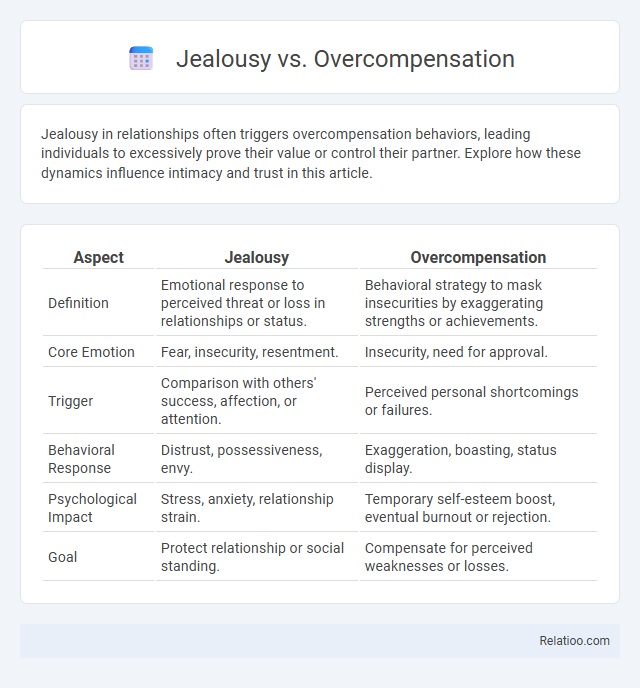Jealousy in relationships often triggers overcompensation behaviors, leading individuals to excessively prove their value or control their partner. Explore how these dynamics influence intimacy and trust in this article.
Table of Comparison
| Aspect | Jealousy | Overcompensation |
|---|---|---|
| Definition | Emotional response to perceived threat or loss in relationships or status. | Behavioral strategy to mask insecurities by exaggerating strengths or achievements. |
| Core Emotion | Fear, insecurity, resentment. | Insecurity, need for approval. |
| Trigger | Comparison with others' success, affection, or attention. | Perceived personal shortcomings or failures. |
| Behavioral Response | Distrust, possessiveness, envy. | Exaggeration, boasting, status display. |
| Psychological Impact | Stress, anxiety, relationship strain. | Temporary self-esteem boost, eventual burnout or rejection. |
| Goal | Protect relationship or social standing. | Compensate for perceived weaknesses or losses. |
Understanding Jealousy: Definition and Core Traits
Jealousy is an emotional response characterized by feelings of insecurity, fear, and concern over a perceived threat to a valued relationship or position. Core traits include envy, possessiveness, and anxiety, often stemming from low self-esteem or fear of loss. Your awareness of these traits helps distinguish jealousy from overcompensation, where excessive behaviors aim to mask underlying insecurities.
What is Overcompensation? Key Characteristics
Overcompensation is a psychological defense mechanism where an individual attempts to cover up perceived weaknesses or insecurities by exaggerating positive traits or behaviors. Key characteristics include excessive assertiveness, perfectionism, and a strong need to prove oneself, often leading to overachievement or dominance in certain areas. Understanding your tendency to overcompensate can help manage underlying feelings of inadequacy and improve emotional balance.
Psychological Roots: Where Jealousy and Overcompensation Begin
Jealousy originates from perceived threats to self-worth or relationships, often rooted in insecurity and fear of loss, while overcompensation arises as a defensive response aimed at masking feelings of inadequacy through exaggeration of abilities or achievements. Both emotions stem from underlying psychological vulnerabilities, including low self-esteem and unresolved childhood experiences influencing adult behavior. Understanding these origins highlights how jealousy and overcompensation serve as coping mechanisms to protect fragile self-concepts.
Signs of Jealousy in Everyday Behavior
Signs of jealousy in everyday behavior include frequent comparisons to others, constant need for reassurance, and displaying passive-aggressive attitudes. Individuals may exhibit possessiveness or become overly sensitive to perceived slights, often reacting with suspicion or distrust. Overcompensation can manifest as exaggerated achievements or attention-seeking to mask insecurities tied to jealousy.
Common Manifestations of Overcompensation
Common manifestations of overcompensation include excessive assertiveness, perfectionism, and an exaggerated need to dominate situations or others to mask underlying insecurities. Individuals may display defensive behaviors, such as controlling tendencies or aggression, aiming to conceal feelings of inadequacy or jealousy. Overcompensation often results in strained relationships and emotional exhaustion due to relentless efforts to prove self-worth.
Jealousy vs Overcompensation: Key Differences
Jealousy arises from fear of losing something valuable to a perceived rival, manifesting as insecurity and mistrust in relationships. Overcompensation involves excessive behaviors aimed at covering up perceived weaknesses or insecurities, often showing as boastfulness or dominance. The key difference lies in jealousy being a reactive emotion tied to external threats, while overcompensation is a proactive strategy to manage internal feelings of inadequacy.
How Jealousy Can Lead to Overcompensation
Jealousy often triggers overcompensation as individuals attempt to mask feelings of insecurity by displaying exaggerated confidence or achievements. This psychological response serves as a defense mechanism to regain perceived social or relational status, often manifesting in behaviors like excessive boastfulness or material acquisition. Overcompensation driven by jealousy can ultimately impact relationships and self-esteem, creating a cycle of insecurity and reactive excessive behavior.
Impact on Relationships and Social Dynamics
Jealousy creates tension and mistrust in relationships, often leading to conflict and emotional distance. Overcompensation, manifested through exaggerated behaviors or achievements, can mask insecurities but might alienate Your partners or peers by fostering imbalance and misunderstanding. Understanding these dynamics helps in managing emotions and promoting healthier social interactions.
Healthy Ways to Address Jealousy and Overcompensation
Jealousy often stems from insecurity and fear of loss, while overcompensation manifests as exaggerated actions to mask feelings of inadequacy. Healthy ways to address jealousy and overcompensation include self-reflection, open communication, and building emotional resilience through mindfulness and therapy. Developing self-awareness and cultivating trust can transform negative emotions into opportunities for personal growth and stronger relationships.
When to Seek Professional Help for Emotional Struggles
Persistent jealousy causing significant distress or relationship conflicts often signals the need for professional help, especially when it leads to obsessive thoughts or controlling behaviors. Overcompensation, characterized by excessive behaviors aimed at masking insecurities, warrants therapy if it disrupts daily functioning or self-esteem. Seeking support from a mental health professional can provide effective strategies to manage emotional struggles and promote healthier coping mechanisms.

Infographic: Jealousy vs Overcompensation
 relatioo.com
relatioo.com